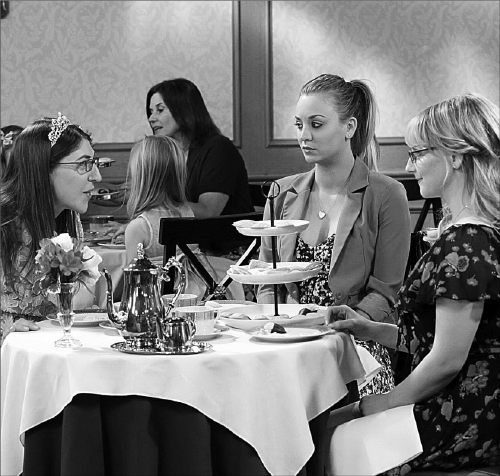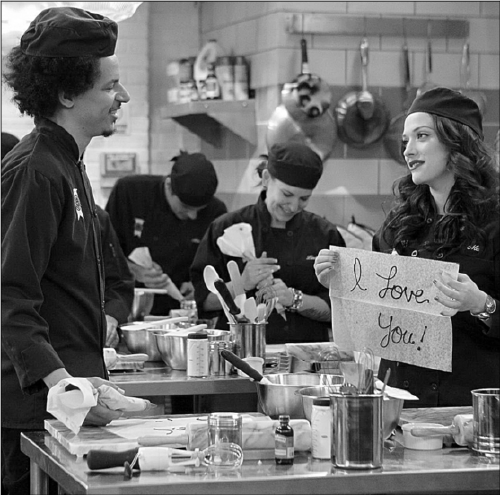
ROBERT VOETS/CBS/GETTY IMAGES
A scene from the popular US TV series The Big Bang Theory on the CBS Television Network.

SONJA FLEMMING/CBS/GETTY IMAGES
A scene from the CBS sitcom 2 Broke Girls.
Television series from the United States have topped the most-watched list and licensed providers in China are calling the trend "an opening era". Xu Junqian explores the scene in Shanghai.
Caroline Channing was in town. Leonard Hofstadter debuted in the capital. Vampire Stefan Salvatore was in the spotlight in Shanghai.
These names, or fictional characters, from US TV series like 2 Broke Girls and The Big Bang Theory, may not ring a bell for everyone. But in China, their visits in 2013 caused traffic jams, large crowds and high-pitched screams at airports, hotels or wherever they appeared. They created such a stir that couch potatoes have hailed the visits "the heyday of US TV in China".
But behind the scenes, the organizers and licensed providers of US TV series in China believe it's just the beginning, or in their words, "an opening era", despite the fact the world's largest television audience has been watching imported US TV series for more than three decades, almost as long as TV sets have been in the country.
In 1980, one year after China and the US established diplomatic relations, two series-Man from Atlantis and Garrison's Gorillas-were introduced and broadcast nationwide by the State-owned China Central Television station. (The first production line of color TV sets in China was installed in Tianjin in October, 1980..
"We define 'opening era' as a time when a certain thing becomes a trend," said Zhang Chaoyang, better known as Charles Zhang, the founder and chairman of Sohu. Inc, one of China's biggest Web portal owners and video site operators, at a news conference in December.
In September 2012, the Beijing-based site took the initiative to buy the license of 31 of the most popular US TV series, including Gossip Girl, Modern Family and Nikita, so that Chinese audiences can watch the shows at "almost the same time as their US counterparts".
Since then, the site has been introducing a substantial number of overseas-produced TV shows. Statistics from Sohu showed that to date there are about 200 American TV series on the site.
"In the past, the viewers of US TV series may have accounted for less than 10 percent of the domestic shows, but now, shows like Th.
Big Bang Theory have been on the most-watched top list," Zhang says.
The sixth season of the US sitcom about four Californian scientists has been played 755 million times on the site.
"I think we can call the audience of US TV series the mainstream now," he adds.
The website failed to detail the ages, education background or gender of the audience of the US TV series in China but describes them as "generally well-educated, well-paid and well-employed". Advertisers seem to think highly of these viewers.
According to Lu Naning, sales director of Sohu video, viewers of US TV series are the most popular among high-end clients-like luxury brands, cars and high-tech gadgets.
But Adam Roseman, the founder and CEO of FansTang, a marketing firm that brings Hollywood celebrities to China, says the shows attract a certain kind of viewer.
"Most American TV shows have viewer bases that are heavily female, with the exception of a few that track heavily male," says the 35-year-old American entrepreneur.
The former investment banker founded the company in early 2012 with a mission to "provide Chinese fans Hollywood at their doorsteps". The Shanghai-based company has held more than 50 events featuring more than 20 celebrities over the past two years, and half of them are actors or actresses from US TV series.
With more Chinese online video portals bidding for the legal license for US TV shows, Roseman has seen a considerable rise in consumption of Hollywood-generated content.
"People are going to watch US TV at this point whether or not they are legally licensed. However, this creates a desire among the licensees in China to promote and further enhance the viewership of this content," he says.
Why is that so?
A netizen nicknamed Amos on Zhihu.com, answers the question simply and bluntly. "We are no fools and can tell what's good," he writes, listing learning English, broadening views and exciting plots as among the reasons the shows are popular.
Charles Zhang from Sohu Inc, provides a more clear-cut definition of "good".
"The US TV series enlighten Chinese young people, just as Western literary works did in the 1980s to me and people of my age with works like Jane Eyre or A Tale of Two Cities," he says. "It inspires one to reflect and perhaps reshape one's values."
We recommend:
